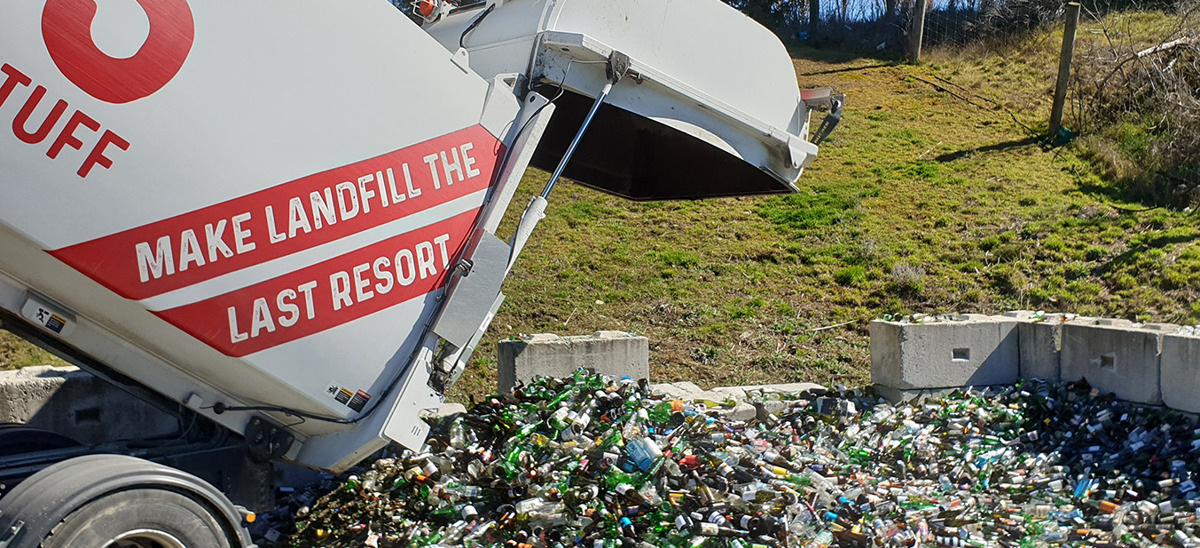Thursday, 20 January 2022
Glass recycling audit highlights clear progress
Queenstown Lakes District residents and businesses are doing an awesome job of glass recycling.

Queenstown Lakes District residents and businesses are doing an awesome job of glass recycling.
Findings from a recent audit undertaken by Queenstown Lakes District Council (QLDC), and funded by the Glass Packaging Forum (GPF), have found glass collected locally for recycling is of high quality with a contamination rate of just 0.35%.
QLDC Waste Minimisation Project Officer Kath Buttar said this represented just 515kg of the total sample of 145,730kg collected glass that was audited.
“With contamination at well below 1% the audit demonstrates how well our community is doing with glass recycling. Glass bottles and jars collected in our district are sent to Auckland to be recycled into new containers right here in Aotearoa New Zealand. Glass which is too highly contaminated can’t be recycled so it’s important we keep monitoring what we collect and encourage the community to continue recycling with care,” she said.
“With the help of Council contractors and GPF, the audit has enabled us to collect comprehensive data on the quality of all incoming glass and find out more about the type and level of contamination so we could take steps to address it. The majority of contamination found was general rubbish and non-recyclable glass like wine or drinking glasses ending up in the blue bin, but other recyclables, such as plastic and cans which should go into the yellow bin, and ceramics were also identified,” she said.
“We now have an improved understanding of areas we need to focus on, such as ongoing operational and educational initiatives, to help keep our glass of good quality.”
The audit was conducted over three months with Council staff developing an innovative online reporting system which Ms Buttar said not only made gathering data easy and effective but also allowed progress to be tracked in real time.
“It’s an awesome system which can be adapted for future projects,” she said.
GPS Scheme Manager Dominic Salmon said the Council did an impressive job. He also commended residents and businesses for the very low contamination rates.
“It’s really good to see results like this. Keeping glass as free from contamination as possible is essential to ensuring it gets recycled and doesn’t end up being wasted in landfill,” he says.
More tips and advice on recycling can be found on the QLDC website here: https://www.qldc.govt.nz/services/rubbish-recycling/how-we-recycle-in-the-queenstown-lakes-district
ENDS|KUA MUTU.
QLDC media contact: communications@qldc.govt.nz or call 03 441 1802.
GPF media contact: Kiri Speirs, Marketing and Communications Manager
021 298 4806 or 06 600 0127
kiri@glassforum.org.nz
FURTHER INFORMATION | Kā pāroko tāpiri:
The total percentage of contamination from each incoming glass stream was found to be as follows:
-
Commercial 0.39%
-
Residential 0.34%
-
Public recycling bins 0.58%
-
Public drop-off (Queenstown) 0.24%.
Contamination levels for both QLDC kerbside and public recycling bin (four-way) glass streams were lower than indicated in previous independent quality audits (1.3% and 0.9% respectively).
About the Glass Packaging Forum
Established in 2006, the Glass Packaging Forum (GPF) is part of The Packaging Forum which is dedicated to developing product stewardship across packaging materials and the packaging supply chain. The GPF meets its objectives through the management of its independent, accredited product stewardship scheme. A primary function of the GPF is to ensure that as much waste container glass (bottles and jars) as possible is diverted from landfill. This is done through the provision of infrastructure to improve glass recovery and facilitate glass recycling and through research of alternative uses for waste glass. These activities are supported by a comprehensive consumer awareness programme. The GPF is funded through its membership which pay a voluntary levy related directly to the volume of glass each sells into the New Zealand market place. For more information visit www.glassforum.org.nz





